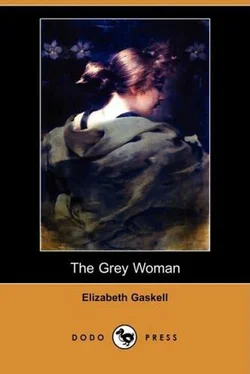The other thing she had to say was this: she had that day met the travelling jeweller to whom she and I had sold my ring. It was rather a peculiar one, given to me by my husband; we had felt at the time that it might be the means of tracing us, but we were penniless and starving, and what else could we do? She had seen that this Frenchman had recognised her at the same instant that she did him, and she thought at the same time that there was a gleam of more than common intelligence on his face as he did so. This idea had been confirmed by his following her for some way on the other side of the street; but she had evaded him with her better knowledge of the town, and the increasing darkness of the night. Still it was well that she was going to such a distance from our dwelling on the next day; and she had brought me in a stock of provisions, begging me to keep within doors, with a strange kind of fearful oblivion of the fact that I had never set foot beyond the threshold of the house since I had first entered it—scarce ever ventured down the stairs. But, although my poor, my dear, very faithful Amante was like one possessed that last night, she spoke continually of the dead, which is a bad sign for the living. She kissed you—yes! it was you, my daughter, my darling, whom I bore beneath my bosom away from the fearful castle of your father—I call him so for the first time, I must call him so once again before I have done—Amante kissed you, sweet baby, blessed little comforter, as if she never could leave off. And then she went away, alive.
Two days, three days passed away. That third evening I was sitting within my bolted doors—you asleep on your pillow by my side—when a step came up the stair, and I knew it must be for me; for ours were the topmost rooms. Some one knocked; I held my very breath. But some one spoke, and I knew it was the good Doctor Voss. Then I crept to the door, and answered.
"Are you alone?" asked I.
"Yes," said he, in a still lower voice. "Let me in." I let him in, and he was as alert as I in bolting and barring the door. Then he came and whispered to me his doleful tale. He had come from the hospital in the opposite quarter of the town, the hospital which he visited; he should have been with me sooner, but he had feared lest he should be watched. He had come from Amante's death-bed. Her fears of the jeweller were too well founded. She had left the house where she was employed that morning, to transact some errand connected with her work in the town; she must have been followed, and dogged on her way back through solitary wood-paths, for some of the wood-rangers belonging to the great house had found her lying there, stabbed to death, but not dead; with the poniard again plunged through the fatal writing, once more; but this time with the word «un» underlined, so as to show that the assassin was aware of his previous mistake.
Numéro Un .
Ainsi les Chauffeurs se vengent.
They had carried her to the house, and given her restoratives till she had recovered the feeble use of her speech. But, oh, faithful, dear friend and sister! even then she remembered me, and refused to tell (what no one else among her fellow workmen knew), where she lived or with whom. Life was ebbing away fast, and they had no resource but to carry her to the nearest hospital, where, of course, the fact of her sex was made known. Fortunately both for her and for me, the doctor in attendance was the very Doctor Voss whom we already knew. To him, while awaiting her confessor, she told enough to enable him to understand the position in which I was left; before the priest had heard half her tale Amante was dead.
Doctor Voss told me he had made all sorts of détours , and waited thus, late at night, for fear of being watched and followed. But I do not think he was. At any rate, as I afterwards learnt from him, the Baron Rœder, on hearing of the similitude of this murder with that of his wife in every particular, made such a search after the assassins, that, although they were not discovered, they were compelled to take to flight for the time.
I can hardly tell you now by what arguments Dr. Voss, at first merely my benefactor, sparing me a portion of his small modicum, at length persuaded me to become his wife. His wife he called it, I called it; for we went through the religious ceremony too much slighted at the time, and as we were both Lutherans, and M. de la Tourelle had pretended to be of the reformed religion, a divorce from the latter would have been easily procurable by German law both ecclesiastical and legal, could we have summoned so fearful a man into any court.
The good doctor took me and my child by stealth to his modest dwelling; and there I lived in the same deep retirement, never seeing the full light of day, although when the dye had once passed away from my face my husband did not wish me to renew it. There was no need; my yellow hair was grey, my complexion was ashen-coloured, no creature could have recognized the fresh-coloured, bright-haired young woman of eighteen months before. The few people whom I saw knew me only as Madame Voss; a widow much older than himself, whom Dr. Voss had secretly married. They called me the Grey Woman.
He made me give you his surname. Till now you have known no other father—while he lived you needed no father's love. Once only, only once more, did the old terror come upon me. For some reason which I forget, I broke through my usual custom, and went to the window of my room for some purpose, either to shut or to open it. Looking out into the street for an instant, I was fascinated by the sight of M. de la Tourelle, gay, young, elegant as ever, walking along on the opposite side of the street. The noise I had made with the window caused him to look up; he saw me, an old grey woman, and he did not recognize me! Yet it was not three years since we had parted, and his eyes were keen and dreadful like those of the lynx.
I told M. Voss, on his return home, and he tried to cheer me, but the shock of seeing M. de la Tourelle had been too terrible for me. I was ill for long months afterwards.
Once again I saw him. Dead. He and Lefebvre were at last caught; hunted down by the Baron de Rœder in some of their crimes. Dr. Voss had heard of their arrest; their condemnation, their death; but he never said a word to me, until one day he bade me show him that I loved him by my obedience and my trust. He took me a long carriage journey, where to I know not, for we never spoke of that day again; I was led through a prison, into a closed court-yard, where, decently draped in the last robes of death, concealing the marks of decapitation, lay M. de la Tourelle, and two or three others, whom I had known at Les Rochers.
After that conviction Dr. Voss tried to persuade me to return to a more natural mode of life, and to go out more. But although I sometimes complied with his wish, yet the old terror was ever strong upon me, and he, seeing what an effort it was, gave up urging me at last.
You know all the rest. How we both mourned bitterly the loss of that dear husband and father—for such I will call him ever—and as such you must consider him, my child, after this one revelation is over.
Why has it been made, you ask. For this reason, my child. The lover, whom you have only known as M. Lebrun, a French artist, told me but yesterday his real name, dropped because the blood-thirsty republicans might consider it as too aristocratic. It is Maurice de Poissy.












